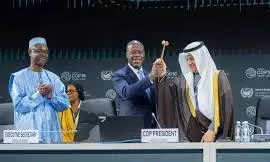
COP16: Saudi Arabia leverages climate tech to combat desertification
text_fieldsAs host of the United Nations COP16 conference on drought and desertification, Saudi Arabia is spotlighting its investment in green innovation to transform its arid landscapes.
The Gulf nation aims to rehabilitate 40 million hectares of degraded land, a bold initiative tied to its Middle East Green Initiative, which also seeks to plant 10 billion trees.
However, while Saudi Arabia leads the Middle East in climate tech investment, critics question whether its initiatives offer genuine climate solutions or serve as greenwashing to offset its continued dependence on oil.
A 2023 PwC report revealed that Saudi Arabia accounts for 75% of climate tech investments in the Middle East, focusing heavily on energy solutions. These investments significantly outpace funding for agriculture, food, and land-use technologies.
One innovative project in Jeddah is exploring the use of microorganisms to treat wastewater efficiently. The technology, developed at the King Abdullah University of Science and Technology (KAUST), turns carbon into methane gas for energy production while recycling filtered water for agricultural use or desert irrigation.
Meanwhile, researchers at KAUST are working on carbon-enriched compost made from chicken manure, transforming desert sand into fertile soil. Himanshu Mishra, an environmental science expert, noted that this innovation acts like a sponge to retain nutrients and water while promoting microbial biodiversity, making it a sustainable solution for combating desertification.
Despite these advancements, scaling these technologies requires substantial financial backing and political commitment. Mishra highlighted the potential for Saudi Arabia to become an exporter of carbon-enriched topsoil and its associated technology, while other experts emphasized the importance of venture capital to demonstrate large-scale feasibility.
While pursuing climate tech, Saudi Arabia maintains its status as the world’s largest crude oil exporter. The kingdom’s circular carbon economy strategy includes carbon capture and hydrogen production, but critics argue these initiatives mask an ongoing reliance on fossil fuels.
Organizations like the European Centre for Democracy and Human Rights (ECDHR) have accused the Saudi Green Initiative of prioritizing energy security over environmental justice. Riyadh, however, asserts that such policies are essential for maintaining its energy infrastructure.





